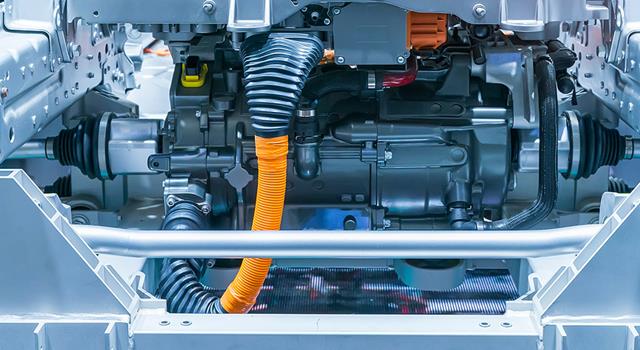Introduction
The electric vehicle (EV) sector has been evolving rapidly in recent years, with advancements in technology playing a crucial role in shaping the industry. NXP Semiconductors, a leading provider of semiconductor solutions, has strategically aligned its innovations and developments to support the growing demand for electric vehicles, especially in the area of sensors. As the automotive industry shifts towards electrification, the need for advanced, reliable, and efficient sensor technologies has become paramount. NXP has positioned itself as a key player in this space by adopting strategies and creating innovative solutions that cater to the unique requirements of the Electric Vehicle (EV) Sensor Market.
NXP Semiconductors: A Brief Overview
NXP Semiconductors is renowned for its expertise in developing microelectronics, including chips, sensors, and processing units that enable a variety of automotive applications. With a strong focus on the electric vehicle market, NXP has been pivotal in driving innovations that enhance vehicle performance, safety, and efficiency. Their semiconductor products are essential for numerous automotive applications, ranging from powertrain and battery management to safety systems and connectivity.
Strategic Approach to the Electric Vehicle Sensor Market
Focus on Integration and Efficiency
NXP’s strategy revolves around providing integrated solutions that combine various sensing technologies within a single platform. This reduces the complexity and cost for automakers while improving the overall efficiency of EV systems. By integrating different sensor functionalities—such as radar, Lidar, ultrasonic, and vision sensors—into a unified system, NXP is helping to optimize the performance of advanced driver assistance systems (ADAS), which are becoming increasingly essential in electric vehicles.
Download Sample of Electric Vehicle Market
Partnerships with Key Industry Players
To further its goals in the EV sensor market, NXP has formed strategic partnerships with major automotive manufacturers and technology companies. These collaborations ensure that NXP’s semiconductor solutions are embedded in the latest EV models, fostering the widespread adoption of its sensors in electric and autonomous vehicles. Their collaboration with OEMs (original equipment manufacturers) and Tier 1 suppliers enhances their ability to meet the specific demands of the automotive industry while driving innovation in the sensor technology space.
Commitment to Sustainability
Sustainability is a core component of NXP's business strategy. As the world increasingly shifts toward electric vehicles, NXP has made significant strides in developing sensor technologies that contribute to more energy-efficient and environmentally friendly transportation. Their innovations focus on reducing the carbon footprint of vehicles by providing solutions that optimize energy consumption and extend battery life, which is critical for the performance and sustainability of electric vehicles.
Emerging Innovations in Electric Vehicle Sensor Technologies
Radar and Lidar Sensors for Enhanced Safety
Radar and Lidar sensors are critical for enhancing safety and driving capabilities in electric vehicles. NXP has invested heavily in the development of radar sensors that offer long-range, high-resolution detection, making them ideal for autonomous driving and ADAS systems. Additionally, their Lidar sensor solutions provide precise 3D mapping, which is essential for safe navigation in complex driving environments.
Battery Management and Energy Efficiency Sensors
In the realm of electric vehicles, one of the most important factors is the management of battery systems. NXP has developed innovative sensors for battery management that help optimize charging cycles, monitor battery health, and ensure the safety of lithium-ion batteries. These sensors are designed to extend battery life, improve energy efficiency, and ensure the safety of EVs, making them indispensable in the growing electric vehicle market.
Advanced Driver Assistance Systems (ADAS) Sensors
ADAS technology is crucial for the safe operation of electric vehicles, particularly as they move towards fully autonomous driving. NXP has been at the forefront of developing sensors for ADAS applications, such as collision detection, lane-keeping assistance, and automated parking. The company’s sensors help enable real-time monitoring of the vehicle’s surroundings, making EVs safer for drivers and passengers alike.
Developments in the Electric Vehicle Sensor Market
Sensor Fusion Technology
Sensor fusion is a key development that NXP has embraced in the electric vehicle sensor market. By combining data from multiple sensors, such as radar, cameras, and ultrasonic sensors, NXP’s solutions offer a more accurate and reliable understanding of the vehicle’s environment. This fusion technology allows EVs to better perceive and react to their surroundings, contributing to the development of fully autonomous vehicles.
Connectivity and IoT Integration
With the growing importance of connectivity in electric vehicles, NXP has focused on integrating Internet of Things (IoT) technologies with its sensors. Their solutions enable seamless communication between vehicles and external systems, such as cloud platforms, traffic management systems, and other vehicles. This connectivity ensures that EVs can access real-time data, enhancing their performance and enabling the transition to smart mobility solutions.
AI and Machine Learning Integration
Artificial Intelligence (AI) and machine learning are becoming essential in the development of smart sensors for electric vehicles. NXP is integrating AI into its sensor technologies, enabling real-time data analysis and decision-making. This allows EVs to adapt to changing driving conditions, recognize potential hazards, and optimize energy consumption, improving the overall driving experience and efficiency of electric vehicles.
Conclusion
NXP Semiconductors has proven itself as a key innovator and strategic player in the electric vehicle sensor market. Through its focus on integration, sustainability, and cutting-edge technologies, the company is playing an essential role in advancing the capabilities of electric vehicles. With its developments in radar and Lidar sensors, battery management systems, ADAS, and sensor fusion technology, NXP is not only enhancing the safety and efficiency of electric vehicles but also contributing to the broader shift toward autonomous and sustainable transportation. As the electric vehicle market continues to grow, NXP’s innovations will undoubtedly play a critical role in shaping the future of the automotive industry.





Comments